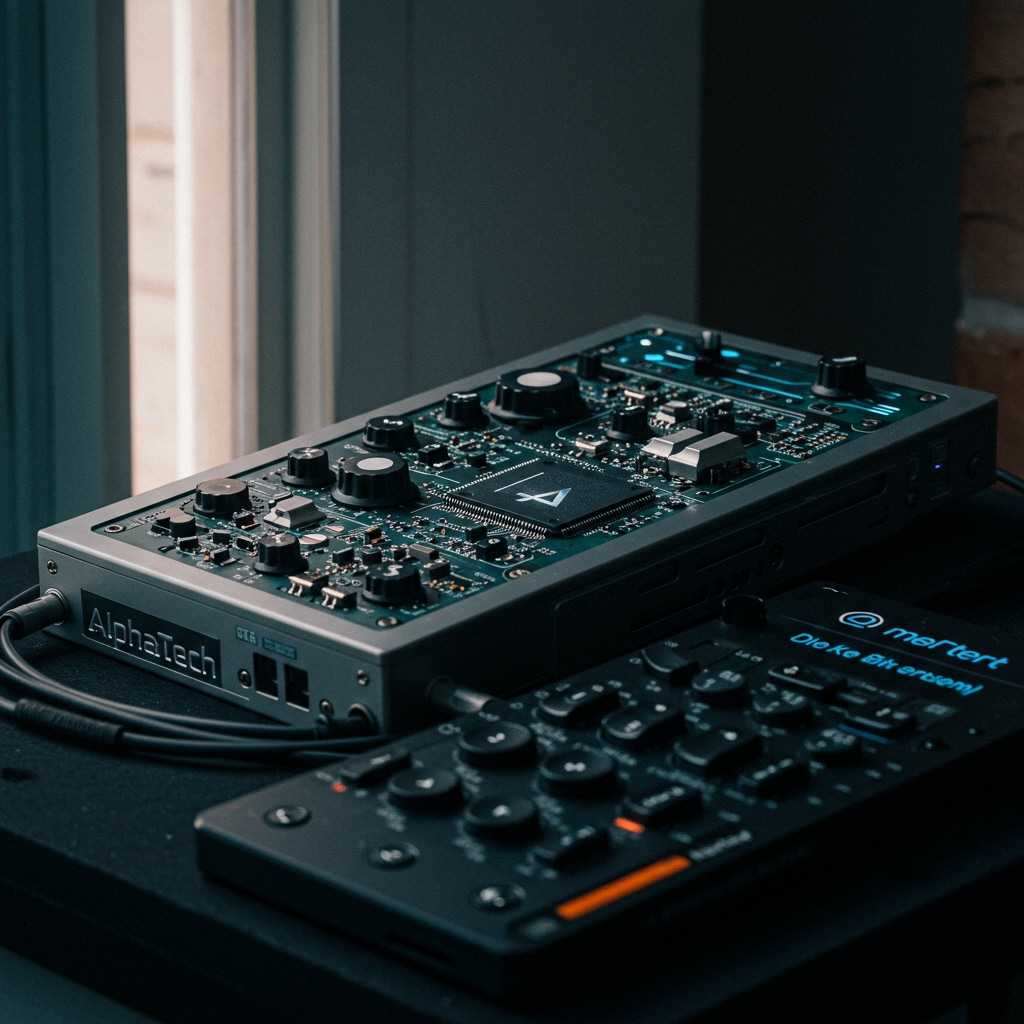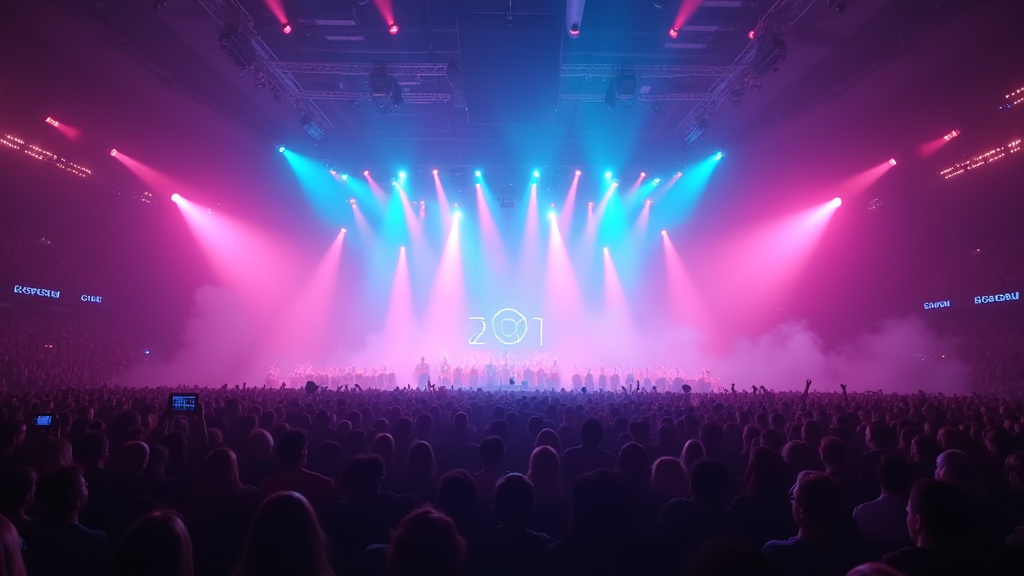AlphaTech Introduces NeuralSync Chip: A Paradigm Shift for Mobile Audio
Tokyo, Japan – At the highly anticipated FutureTech Expo 2025 held in Tokyo, global technology leader AlphaTech announced a groundbreaking innovation poised to redefine the landscape of mobile music creation and audio processing. The company unveiled its revolutionary ‘NeuralSync’ mobile processor chip, a dedicated silicon solution specifically engineered with a powerful, on-device artificial intelligence engine. This development marks a significant stride towards enabling sophisticated, low-latency, real-time audio processing and advanced generative music capabilities directly on consumer-grade smartphones and tablets.
The announcement was made during a keynote address delivered by AlphaTech CEO, Dr. Evelyn Reed. Addressing a global audience of industry professionals, developers, and media, Dr. Reed highlighted the transformative potential of the NeuralSync chip, emphasizing its core architectural advantage: a tightly integrated AI engine optimized for the demanding computational tasks inherent in modern digital audio workstations (DAWs) and music production applications.
Dr. Reed presented preliminary performance benchmarks illustrating the dramatic leap forward represented by NeuralSync. According to AlphaTech’s internal testing, early prototypes equipped with the new chip demonstrate an astonishing 400% improvement in AI music rendering speeds compared to what the company refers to as ‘previous mobile silicon generations.’ This substantial performance gain is expected to translate into smoother workflows, faster processing times for complex audio effects and virtual instruments, and, critically, unlock entirely new possibilities for AI-assisted and generative music creation that were previously confined to high-end desktop computers.
Engineering for On-Device Intelligence
The core innovation behind NeuralSync lies in its specialized hardware acceleration for AI models directly on the mobile device. Unlike solutions that rely heavily on cloud processing, the NeuralSync chip processes complex AI algorithms locally. This on-device approach is crucial for achieving the ultra-low latency required for real-time musical performance, recording, and effect manipulation. Musicians and producers often require near-instantaneous feedback from their software instruments and effects; even milliseconds of delay can disrupt creative flow and technical execution. By keeping AI computation on the device, NeuralSync aims to eliminate network dependencies and reduce latency to imperceptible levels for most audio tasks.
Furthermore, the dedicated AI engine is tailored specifically for audio-related computations. This includes tasks such as analyzing audio signals for tempo and harmony detection, generating musical patterns or melodies based on learned styles, automating complex mixing and mastering tasks, and enabling highly realistic virtual instruments and effects driven by AI models. The chip’s architecture is designed to handle large neural networks optimized for audio processing efficiently, consuming less power than general-purpose processors attempting similar tasks.
Industry Collaboration and Ecosystem Development
AlphaTech is not developing the NeuralSync chip in isolation. Recognizing the need for robust software support to fully realize the chip’s potential, the company has reportedly been engaging in close collaboration with major players in the music software industry. Notably, leading music software developers ‘AudioDynamics Inc.’ and ‘BeatCrafters Ltd.’ are working alongside AlphaTech engineers. These collaborations are focused on integrating native NeuralSync support into their flagship mobile DAWs and production applications. This proactive approach ensures that when devices featuring the NeuralSync chip become available, a compelling ecosystem of optimized software will be ready to leverage its capabilities.
Integration with established and widely used software platforms from companies like AudioDynamics and BeatCrafters is a critical step towards broad market adoption. It ensures that existing users of these popular applications will benefit from the performance enhancements and new AI features enabled by NeuralSync simply by upgrading to compatible hardware. This strategic partnership model is expected to accelerate the impact of NeuralSync on the mobile music production market.
Timeline and Market Impact
AlphaTech has set an ambitious, yet concrete, timeline for the NeuralSync chip’s rollout. Mass production of the chip is scheduled to commence by Q3 2025. This timing suggests that consumer devices featuring the NeuralSync chip could begin appearing on the market towards the end of 2025 or early 2026, depending on device manufacturer integration cycles.
The potential market impact is significant. By bringing sophisticated AI audio processing and generative capabilities to the mass-market mobile device, AlphaTech could lower the barrier to entry for advanced music production. What once required expensive dedicated hardware or powerful desktop computers might become accessible to anyone with a modern smartphone or tablet. This democratization of advanced audio tools could foster a new wave of creativity among musicians, producers, podcasters, and sound designers who rely on mobile devices for their work.
Industry analysts attending the FutureTech Expo 2025 noted that the NeuralSync chip could catalyze innovation across the mobile audio software ecosystem. Beyond DAWs, potential applications include enhanced audio recording apps, real-time vocal processing for streaming and communication, intelligent noise cancellation, and interactive music generation tools for content creation.
In conclusion, AlphaTech’s NeuralSync chip represents a bold step forward in integrating powerful, dedicated AI hardware into mobile processors specifically for audio applications. With mass production slated for Q3 2025 and key industry partnerships already in place, the company appears well-positioned to drive a significant transformation in how music is created and audio is processed on mobile devices in the coming years.





